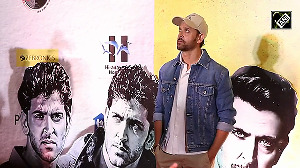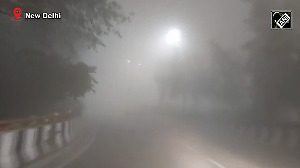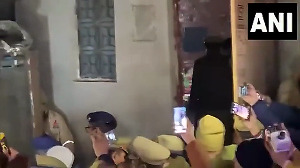 Prime Minister Narendra Modi on Friday said the doors of the government were open for addressing "grievances" of all sections in Jammu and Kashmir under the Constitution but made it clear there cannot be any compromise with the nation's integrity.
Prime Minister Narendra Modi on Friday said the doors of the government were open for addressing "grievances" of all sections in Jammu and Kashmir under the Constitution but made it clear there cannot be any compromise with the nation's integrity.

An all party meeting convened by the Centre to discuss the current unrest in Kashmir, was told by Modi that the Centre was committed to finding a permanent and peaceful solution as per the basic tenets of the Constitution.
"We all are committed to the national sentiment that there cannot be any compromise with the country's integrity.
"We are ready to address the grievances of all sections under the Constitution," Modi told the marathon four-hour meeting, adding his "heart was pained" over the 35-day unrest that has claimed the lives of 55 people.
Modi, who chaired the meeting attended by its ruling ally People's Democratic Party and opposition parties, also targeted Pakistan and said Pakistan-occupied Kashmir is also part of Jammu and Kashmir.
Modi minced no words in terming cross-border terrorism supported by Pakistan as the root cause of turbulence in the Valley and said the time had come to expose the atrocities committed "by our neighbouring nation" in Balochistan and the areas of Jammu and Kashmir under its illegal occupation.
The meeting was convened on a day when Lok Sabha unanimously passed a resolution, appealing for urgent steps to restore order and peace in the Valley while asserting that there can be no compromise with the country's integrity and security.
The PDP said the concern shown for Jammu and Kashmir at the meeting was "noteworthy" but it should be followed by confidence building measures to set off the democratic political process.
Some opposition parties demanded that an all party delegation be sent to Kashmir. But, Home Minister Rajnath Singh, who was flanked by Finance Minister Arun Jaitley at a news conference, said before sending such a team, the state government has to undertake some ground work.
"Once state Chief Minister Mehbooba Mufti informs me that the ground work has been done, we will consider sending it," Singh said.
Asked whether any decision had been taken on curbing the use of pellet guns which has triggered an outrage, both Singh and Jaitley said an expert committee has already been formed by the home ministry and once a report is filed, a decision will be taken.
"We have to see the security implication as well as an alternative option. The pellet guns have been used in 2010 also. It's getting highlighted this time only," Jaitley said.
Jaitley said all the political parties spoke in one voice and came out and put forth their views in right intent.
Singh said the prime minister called for launching a diplomatic offensive against Pakistan by "exposing" its actions in Balochistan and PoK.
The prime minister asked the external affairs ministry to get in touch with residents of PoK settled in various parts of the world and gather information about the "pathetic state of affairs" there and inform the world community about it.

"Whatever lies Pakistan may spread, the world will not fall for its propaganda and disinformation," Modi said.
He said the neighbouring country has forgotten that it uses its fighter aircraft to bomb its own people. "Now the time has come that Pakistan will have to give an account before the world of the atrocities committed on the people of Balochistan and PoK," the Prime Minister said.
Asked about the take away from the meeting, Jaitley said all parties are on the same opinion and the national approach is broadly consensual and there was no laxity in the government's policy on Kashmir.
"Consensus is there will be no compromise on terror or with separatism. Security alertness will be utmost and using this as the base, we will try and ensure that normalcy returns so that as far as average citizen is concerned, life returns to normal," he said.
Jaitley added that there will be no lowering of guard as far as security is concerned, but security forces will act with restraint.
"Terrorism and violence will be dealt with effectively. As far as the life and comfort of people of ordinary people is concerned, we shall try and ensure that life is brought to normal as far as their circumstances are concerned," he said.
During the meeting, the Congress and Left parties called for talks with mainstream and non-mainstream parties and "other stakeholders" and stop use of pellet guns.
Making a strong pitch for "healing the wounds" of Kashmir to defuse the "extremely tense and tragic" situation, Congress leader Ghulam Nabi Azad insisted that what is important is to "heal the wounds and not to close the doors of dialogue. Win the hearts and minds of people in general and youth in particular."
This, he said, should be done by "cajoling,....love and affection as we cannot win over by confrontation"
Former Prime Minister Manmohan Singh, who was the first speaker at the meeting, said it is for the government of India to come up with a roadmap for defusing the situation.
Azad quoted Singh impressing upon the government that the "most important thing" at the moment was to defuse the present situation.
"We assure the government that any positive step to resolve the issue in Kashmir, they'll have our full co-operation", Singh said, adding that during the 10 years of the United Progressive Alliance, efforts were made to find "practical and pragmatic" solution to these issues.
The Communist Party of India-Marxist sought immediate start of a dialogue with all stakeholders to restore normalcy in the Valley and asked the government to take a series of confidence-building measures including stopping the use of pellet guns to quell the ongoing unrest there.
"There was virtual unanimity on the suggestion that a political dialogue should be started immediately with all stakeholders in the state to restore normalcy," CPI-M leader Sitaram Yechury said.
Jaitely, during the press conference, was asked about the difference in the situation in Kashmir today and in 2010, and he said there are new trends as has been witnessed world over and various speakers at the meeting gave their own analysis and assessment.
"Between 2010 and 2016 the change taking place world over, I think ideologically that also has a role to play in the Valley," he said.
Jaitley, however, said the dialogue with mainstream parties is already on and did not specify a date when it will be started with other stakeholders.
To another question on the policy to be adopted on Kashmir in bringing normalcy, the finance minister said, "There is no separate central or state government policy on Kashmir. It is a central policy. This government will decide on its policy as per the situation."
Rajnath earlier said the exercise on the Rs 80,000 crore economic package for the state is already underway and some amount has already been sent to the state and the rest will be given clearance by the finance ministry soon.

He also said that recruitment of 10,000 special police officers in the state was on besides raising a battalion of central armed police force and five India Reserve battalions.
At the meeting, the prime minister while seeking the support of all political parties said, "When terrorism is on the rise across the world and when we are encircled by terrorism sponsored by the neighbouring country, then we will have to be united in this fight. The government expects constructive support from all opposition parties on this."
"I have complete confidence that with the dedication of the state government and with your total cooperation we will soon restore normal life in Jammu and Kashmir again," he said as he praised Chief Minister Mehbooba Mufti's government, in which the Bharatiya Janata Party is a partner, for its "careful handling" of the issue despite odds.
Like every Indian, he also felt "deep pain" over the events in the state, Modi said, adding it was painful that students were unable to study, apples produced in large quantity in the Valley were not reaching the markets and government offices were unable to carry out public welfare works.
"Whoever be killed, whether civilians or security forces, we all feel the pain. I have full sympathies with their families. We are committed to providing good health care to the injured and also towards restoring peace in the Valley so that people could live their normal lives..." he said in his concluding remarks.
Invoking former Prime Minister Atal Bihari Vajpayee again, he said his government would follow the path shown by him, a reference to the former prime minister's offer to hold dialogue under the framework of 'insaniyat (humanity), jamhuriyat (democracy) and Kashmiriyat'.
This is the second time in less than a week Modi has reached out to the people of the state and shown willingness towards dialogue with all stake-holders there.
The government's efforts include reaching out to the civil society and speed up measures to integrate Kashmir's youth with the state's economic activities.
Noting that Kashmiris of different religions are living in various states, the prime minister said the governments there should reach out to them and ensure that they share with their relatives and acquaintances back home the stories of progress and development in those areas.






 © 2025 Rediff.com -
© 2025 Rediff.com -